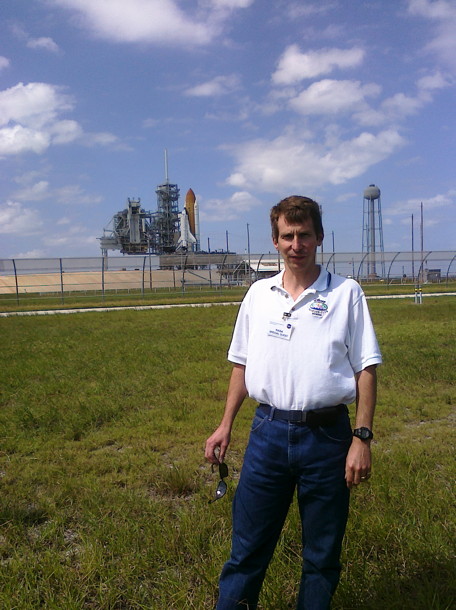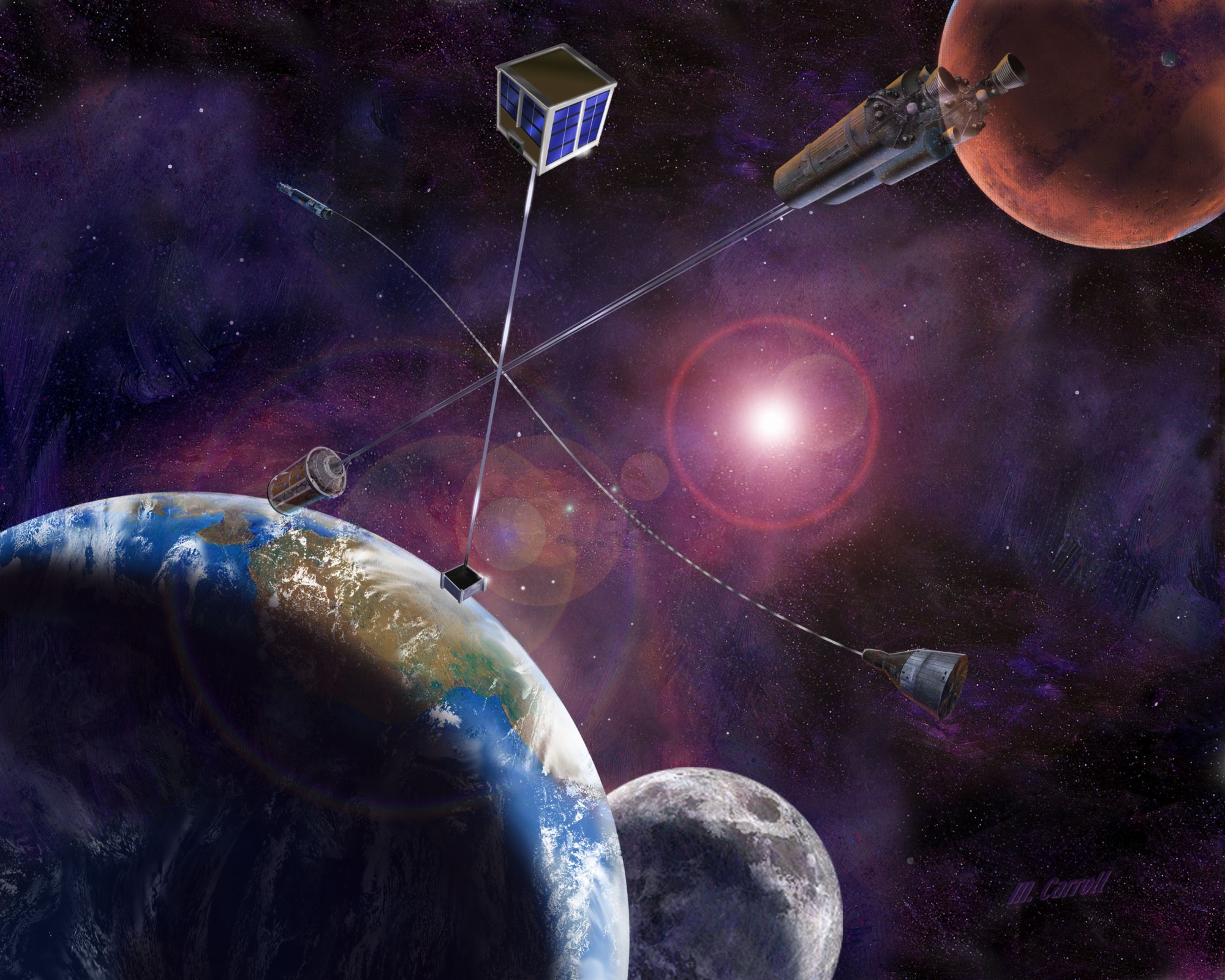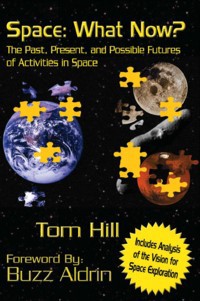|
|
 |
|
Here's the latest on space, and my opinions on it... This is the legacy site, with blog
entries from November, 2004 through June, 2011. Updates after June 9, 2011 can be found at http://spacewhatnow.com/SWN
|
 |
|
|
Thursday, April 29, 2010
Asteroid Water!
This is very exciting news. Water on asteroids will make them potential bases.
8:37 pm est
Monday, April 26, 2010
Rocket Racing League Takes Flight
No idea how this fits in the plans to commercialize the effort, but boy it looks cool.
I Want This
The tie to space is somewhat tenuous, but you'll get it if you watch the video. Someone installed TVs in their basement that make it look like you're looking out windows. The kicker is that the view changes as one person changes
their position in the room. Excellent!
Update: The website for the folks making this is pretty impressive, and the software to handle it costs $12 ($10 for the Mac portion, $2 for
the iPhone portion). The TVs they used are just under $1000 each at Amazon. Tempting...I wonder if my MacBook Pro could
power it? They use a Mac Pro.
Sunday, April 25, 2010
Hubble at 20
NASA's celebrating another anniversary in the form of yesterday's 20th anniversary of the Hubble Space Telescope. The celebration includes a new jawdropping image as well as a (now passed) opportunity to talk with retired astronauts who helped deploy the telescope. I'm wondering if they'll celebrate 20 years again in honor of Hubble getting its eyesight fixed in 1994.
One of my funniest memories related to Hubble was when the first servicing mission was launched. CNN planned to cover the
servicing live for hours at a time, including dramatic graphics about 'Repair in Space' or something along those lines. No
one at the news network realized that the repair would be mind-numbingly boring to watch. The coverage continued for a while,
and eventually they started flailing around looking for someone to talk to. They ended up getting an executive from the company
that made the space suits on the phone, and asked him what would happen if one of the space suits sprung a leak. I pictured
the person sitting on the edge of their bed in their underwear while giving the interview. Eventually, full coverage was
abandoned and they went back to covering Some BS Happening Somewhere (warning: video, not safe for work due to language).
All joking aside, Hubble is the public's favorite satellite and likely the only observatory of any kind that most people can
name. It's an amazing achievement, and I look forward to seeing more pictures from the craft.
Wednesday, April 21, 2010
How to Build a Cheaper, yet Still Reliable, Spacecraft
Jim Oberg has some thoughts. I agree with the sentiment, but feel that if his advice is taken too literally with no options to grow in capabilities
expansion beyond LEO will be delayed or halted.
Friday, April 16, 2010
Early Candidate Asteroid
Well, a lot needs to happen between now and 2025, the nominal date of our first asteroid trip, but I've looked and found what
may be a good candidate for the mission. The asteroid 2008 ST will make a close approach at closest about 11 lunar distances (more likely about 14) with a relative velocity difference
of 2.43 km/sec at infinity. The velocity difference is will be a big driver. You can look at your own list here (may take a while to process). Maybe someone will name the asteroid after our president...
Thursday, April 15, 2010
Where I'll be Next Saturday
I'll be giving a talk about space on Saturday the 24th at NOVAC's Star Party in Virginia. My talk is at 5:00, and called "Space: An Update." The primary focus is unmanned activities, but who knows
what might come up in Q&A. If you're there, say "Hi!"
The Speech
Well, it's over. I didn't see it live, and haven't watched it recorded yet. There's a version of it here, and a transcript here. Plenty of chatter, with a highlight at Space Politics.
Friday, April 9, 2010
More Details Coming in on new Plan
Some new information is coming out about the new space plan. It's still unclear what relation any of this has to the upcoming
summit at KSC.
Tuesday, April 6, 2010
Compromise A'Brewin'(?)
Lots of talk here, here, and here about leaks of what may or may not be announced on April 15th (Tax Day!) at KSC.
The basics that seem consistent across the discussions are: - Ares I and V stay dead
- Commercial space is still alive
- Orion
comes back in the form of Orion "Lite"
- Shuttle continues to fly at a rate of 1-2 flights per year
- NASA develops a "Deep
Space Habitat"
- NASA uses Shuttle components for a side-mounted "heavy lift" booster
The only things that I really like are items 1, 2, and 4. Orion "Lite" will compete with commercial launch providers, both
for interest by NASA management and interest by astronauts (in that competition, who do you think will win?). Shuttle flights
will take about $3B per year in budget, no matter how much they fly. The reason the program ended in 2010 was to provide
that additional funding. A side-mounted "heavy lift" booster (no upper stage is listed) would eat away at potential commercial
delivery contracts, making them more expensive, while not delivering large enough payloads in one flight to make a real difference.
Other than that, everything is fine.
Monday, April 5, 2010
Well, Duh
7:13 pm est
Sunday, April 4, 2010
From Elon's Mouth
2:02 pm est
Dragon Escape Rocket
Just glancing through the comments on the Selenian Boondocks page linked to previously, I found this comment describing the early design of SpaceX's escape rocket. it will be a liquid engine using the same fuel tanks
as are used by the Dracos on orbit (i.e. fuel isnít wasted just for abort) and will be capable of abort any time until orbit
is reached, not just during the first stage burn. Itís supposed to be a pusher LAS. No idea on the sources or
validity of the claim, but this 'semi-stage' approach for the escape rocket is very cool. I've talked about similar approaches
(even asked Elon about it at a conference, so it's possible I'm partially an inspiration...), but limited my discussion to
solid propulsion. A simple liquid rocket could be very cool, and if it's fueled by propellants that will be used anyway,
the parasitic mass of the system drops quite a bit. There's a bit more involved in the trade because the engine is carried
all the way to orbit, but again, since it could be used on orbit, I think the trade is a winner.
It's True that Falcon 9 Hasn't Flown yet...
But it's a lot closer to orbital flight than any part of the ESAS hardware. Both of them were announced around the same time.
Saturday, April 3, 2010
Would I fly on an EELV?
There seems to be some discussion about how safe it would be to fly on an EELV or other commercially-built launch vehicle.
So the question boils down to: would I fly on one?
I already applied to the astronaut program twice, once in 1999 and once in 2009, so my actions show I'm willing to fly on
the space shuttle. Willing to do so despite its 2 failures in soon to be over 130 flights. Despite this record, many people
view the space shuttle as safe, and "human rated." When the shuttle first flew the following were true: - No one had
flown on ANY portion of Columbia's hardware before, and no space shuttle had been in orbit
- The only escape option
was an ejection seat covering the very beginning and the very ending of the mission
- Most components in the system were
built by the lowest bidder on a government contract
- The spacecraft was supported by a workforce of thousands, providing
a maximum launch rate of 9 flights in a year in 1985
How would this be different than an EELV flight today? Assuming
that a built and tested capsule existed that fit on top of one of the EELV boosters, and some sort of monitoring system was
installed on the booster to detect a failure in time to trigger an escape system: - Delta IV has launched 12 times without a catastrophic failure. The one partial failure of the Delta IV Heavy booster still achieved orbit, but the orbit
wasn't as high as expected.
- Atlas V has launched 20 times without a catastrophic failure. Once again, there is one partial failure where the payload achieved orbit, just not as high
as planned.
- Either system would allow escape from a malfunctioning booster
- The 'stacked' method of integration keeps
the capsule at the top, with its protective heat shield covered throughout most of the flight.
- My flight would be one of
tens that year...not all of them launching people, others would launch satellites, propellants for depots, or other payloads
no one has thought of yet.
Yep, I'd do it.
|
|
|
 |
|
|
|
 |
|
Space: Search Now! with Google
| Tom and Discovery |

|
| Taken During a Tour of KSC on 6 Oct 2010 |
| TEMPO≥ Update |

|
| Click on the picture to go to the Mars Society TEMPO≥ Page |
| Solar System Ambassadors |

|
| Click on the image above to see Tom's SSA profile |
Email Comments to tom [at]
spacewhatnow.com
| Latest book! Click on the cover to purchase |

|
| I Want to go to Mars is a picture book for beginning readers |
More information on I Want to go to Mars can be found in the devoted section of this web site.
Join the Space:What Now? email list for updates on book events or articles published by the author. Email
addresses will not be shared.
I kind of wrote this off, thinking I was being spammed, but I'd like to know if people are really signing up. Please enter
the text you see below in the second line, and I'll get a warm, fuzzy feeling that people are actually reading and signing
up for mail!

| Now Available! |

|
| Clicking here will take you to purchasing options for SWN |
| Get your SWN Gear! |
|
|
| Powered by CafePress |
|
 |
|
|
|
|
|
Scotty
The Updated Past, Present and Possible Futures of Space Activity
|
|
|
 |

